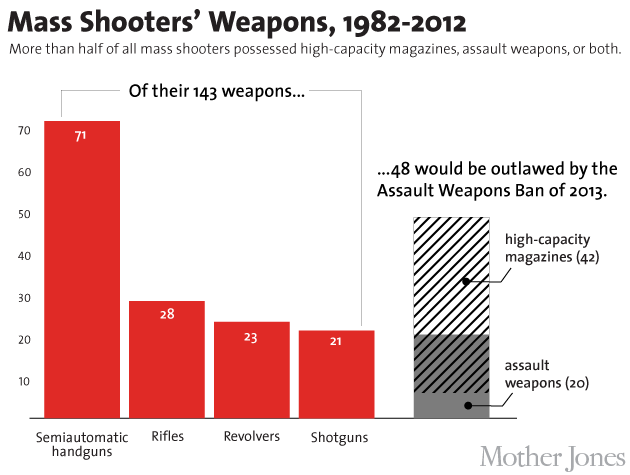
The Bushmaster XM-15 assault riflePhoto courtesy of <a href="http://www.bushmaster.com/firearms/xm-15.asp">Bushmaster</a>
Last December, four days after Adam Lanza murdered 20 first graders and six educators at an elementary school in Newtown, Connecticut, Cerberus Capital Management pledged to sell the Freedom Group, the company that manufactured the Bushmaster XM-15 assault rifle that Lanza used. The announcement helped tamp down a rising PR disaster for the Manhattan private equity firm, placating major investors such as the California State Teachers Retirement System (CalSTRS), which had said it was “examining” its $750 million stake in Cerberus after the massacre. The New York Times described the move as “a rare instance of a Wall Street firm bending to concerns about an investment’s societal impact.”
A year after the Newtown tragedy, however, Cerberus has not sold Freedom Group (also known as Remington Outdoor Company Inc.), the nation’s largest firearms and ammunition conglomerate. After buyers failed to materialize early this year, Cerberus CEO Stephen Feinberg announced he and a small group of individuals would seek to buy the company, which also owns brands such as Remington, Marlin, and Dakota Arms. But in July, the Wall Street Journal reported that Feinberg was dropping his bid amid increasingly attractive offers from outside investors. “Cerberus initially planned to seek around $1 billion for the company,” the Journal reported, citing an anonymous source, “but now wants more.”
Business has boomed for Freedom Group in the year since the mass shooting at Sandy Hook Elementary. Between January and the end of September, the company raked in $94 million in profits on more than $1 billion in gun and ammo sales, compared with just $500,000 in net profits during the same period in 2012. For the full year ending December 31, Freedom Group estimates that its net sales will be up 34 percent to $1.25 billion, according to a financial disclosure (PDF) released Monday. Though Freedom Group doesn’t release sales figures specifically for the Bushmaster XM-15 assault rifle, that weapon and similar models reportedly flew off retailers’ shelves in the weeks after Sandy Hook, snatched up by firearms enthusiasts who feared the guns would soon be outlawed.
According to the Freedom Group’s third quarter report, this year’s earnings spike came primarily from a $42 million bump in sales of “centerfire rifles,” a category which includes the XM-15. The report further notes that Freedom Group’s leading sellers were “modern sporting rifles”—the firearms industry’s euphemism for assault weapons. “Consumer concern over more restrictive governmental regulation on the federal, state, and local levels has contributed to this increase in demand,” the report says. The company would have sold even more guns, the report adds, if not for “sales demand being greater than our current production capacity in many categories.”
“We wish that this anniversary were not coming and that we were not holding Freedom Group,” said Mike Sicilia, a spokesman for CalSTRS, adding that the teachers pension fund is prohibited by its investment contract with Cerberus from discussing financial details. “It’s difficult on all of us because we represent the futures of teachers. Teachers were killed at Sandy Hook, and that gun was made by a company that we partially own. We all feel that.”
Sicilia suggested that withdrawing its large investment from Cerberus is a complicated matter, and is not the pension fund’s preference. CalSTRS believes Cerberus “has made a good-faith effort to sell the company and will find a buyer,” he said.
In announcing its plans to sell the Freedom Group last December, Cerberus distanced itself from the brewing fight over gun control. “As a Firm, we are investors, not statesmen or policy makers,” said a Cerberus’ press release. Our role is to make investments on behalf of our clients…It is not our role to take positions or attempt to shape or influence the gun policy debate. That is the job of our federal and state legislators.”
But the same cannot be said for the company it controls, whose ties to the most powerful gun lobbying group are clear. In May, the National Rife Association inducted three Freedom Group executives—CEO George Kollitides, Vice Chairman Wally McLallen, and President Scott Blackwell—into its “Golden Ring of Freedom,” a group who’ve given the NRA at least $1 million. “Beyond the business world, [Kollitides] has made important contributions to conservation efforts and the gun rights movement,” Tyler Schropp, the head of the NRA’s major gifts department, said in a video honoring the new inductees. And as Mother Jones first reported last January, Kollitides has sat on the NRA’s exclusive nine-member nominating committee, which closely controls who can be elected to the NRA board.
Judging from the fortunes of similar publicly traded gun companies, selling the Freedom Group in the immediate aftermath of the Sandy Hook massacre would have meant leaving a lot of money on the table. In the three days following the shooting, for instance, the stock of Smith & Wesson, which also makes assault rifles, fell by 20 percent. Yet after the collapse of national gun control legislation this spring, Smith & Wesson shares quickly recovered, closing in August at their highest price since before the 2007 financial meltdown.
Cerberus’s failure to divest from the Freedom Group as its gun sales have soared suggests to some gun-control advocates that Cerberus hasn’t been a motivated seller. “It’s a concern,” says Jennifer Fiore, the executive director of Campaign to Unload, a coalition of some 30 education and gun control associations organized by New York Mayor-elect Bill de Blasio. “It leads one to question whether they are negotiating in good faith.”
Cerberus did not respond to requests for comment. But according to a report in the New York Times on Monday, the company now says it has a plan to offer concerned investors like CalSTRS a way out with “an interim step”: It will allow them to sell their stakes in Cerberus to a third-party investor, which will take a minority stake in Freedom Group and provide about $200 million in debt financing. The deal would value Freedom Group at about $1.2 billion.
On Monday, Campaign to Unload, religious leaders, and gun violence victims held a vigil outside Cerberus’ Manhattan headquarters aimed at pressuring it further to divest from Freedom Group. “Half measures from Cerberus Capital Management are not enough,” Fiore said in a press release. “As principal owner of one of the most toxic products in America, Cerberus and its CEO, Stephen Feinberg, have an ethical imperative to unequivocally divest from Freedom Group.”









